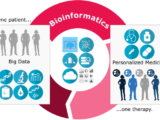
Decoding Your Future: A Beginner’s Guide to Starting a Career in Bioinformatics
August 15, 2024Step 1 – Earning a Bachelor’s Degree Is Essential!
To qualify for entry-level positions in bioinformatics, a bachelor’s degree is the minimum requirement. While many schools don’t offer specialized bioinformatics programs, you can pursue related subjects like computer science, biology, and mathematics to build a strong foundation.
After high school, you can enroll in a college that offers an undergraduate program in bioinformatics. Alternatively, you can choose disciplines such as life sciences, genetics, biomathematics, computational biology, computer science, or statistics to start your career in bioinformatics.
Courses in statistics and mathematics are particularly useful for developing skills in big data analysis, while computational biology focuses on working with databases and interpreting data.
To enhance your job prospects, consider securing an internship during your final year of study. Gaining hands-on experience will deepen your understanding of theoretical concepts and help you smoothly transition into a job or further studies.
Step 2 – Pursue a Master’s Degree for Enhanced Opportunities
To gain advanced expertise in bioinformatics and qualify for higher-paying positions, consider pursuing a master’s degree in bioinformatics. If you’re aiming for a Ph.D. in the future, you might want to focus on specialized courses such as genetics and genomics.
Alternatively, you can gain valuable experience through internships or training opportunities at medical labs, health institutes, or other relevant organizations. Completing an internship will boost your confidence and prepare you for a full-time job in the field.
Step 3 – Obtain a Bioinformatics Certification
If you’re not yet ready to commit to a master’s degree in bioinformatics, consider pursuing a certification in the field. Many graduates from life sciences, computer science, statistics, biomedical science, microbiology, biotechnology, pharmacy, or related disciplines find bioinformatics certificate programs beneficial.
These certifications are particularly useful for those looking to switch careers into bioinformatics, especially if they have a strong interest in biology and computational methods.
A six-month online bioinformatics course can provide foundational knowledge in areas such as:
- Bioinformatics
- Molecular Docking
- Computer-Aided Drug Discovery
- In-Silico Pharmacological Studies
- Next-Generation Sequencing (NGS) Data Analysis
Look for programs that also offer soft skills development and placement assistance to enhance your career prospects.
Bioinformatics Jobs
1. Bioinformatics Analyst
A bioinformatics analyst’s role is to analyze biological data, interpret results, and provide insights using computational tools and algorithms.
2. Research Scientist (Bioinformatics)
Bioinformatics scientists conduct research in areas like genomics, proteomics, and systems biology, utilizing bioinformatics tools for data analysis.
3. Biostatistician
Biostatisticians apply statistical methods to biological data, contribute to experimental design, and help interpret results.
4. Computational Biologist
A computational biologist’s role is to develop algorithms and computational models to analyze biological systems and processes.
5. Clinical Bioinformatician
A clinical bioinformatician works in healthcare settings and utilizes bioinformatics tools and techniques to analyze clinical and genetic data. They interpret genetic information, support personalized medicine initiatives, and contribute to the analysis of clinical data for medical decision-making.
6. Pharmaceutical Bioinformatician
A pharmaceutical bioinformatician’s role is to apply bioinformatics in drug discovery, genomics, and pharmacogenomics to enhance the development of pharmaceuticals.
7. Data Scientist (Bioinformatics)
A data scientist specializing in bioinformatics’s role is to handle and analyze large datasets (biological and genomic information). They leverage machine learning techniques for the interpretation of biological data (for research or practical applications).
8. Bioinformatics Faculty/Researcher
A bioinformatics faculty cum researcher teaches and conducts research in academic institutions, contributing to advancements in bioinformatics.
9. Bioinformatics Software Developer
A bioinformatics software developer is responsible for creating and designing software tools specifically tailored for bioinformatics analysis and research. This involves developing applications, algorithms, and platforms that assist in the processing, interpreting, and visualizing biological data.
10. Genetic Counselor
A genetic counselor guides individuals and families about genetic disorders, and they may incorporate bioinformatics in their practices. Bioinformatics experts can play a role in interpreting genetic data, identifying potential risks, and understanding the implications of genetic information for individuals and their families.
Integrating bioinformatics tools and analysis in genetic counseling practices can enhance the accuracy and depth of information provided to individuals seeking guidance on genetic issues.
11. Biotech Analyst
A biotech analyst analyzes trends in biotechnology, evaluates market data, and provides insights for decision-making.
12. Bioinformatics Consultant
A bioinformatics consultant offers expertise to organizations or projects and provides solutions for bioinformatics-related challenges.
Where to Apply for Bioinformatics Jobs
Bioinformatics jobs are available across various sectors, including academic institutions, research organizations, pharmaceutical companies, biotechnology firms, healthcare institutions, and IT companies specializing in life sciences.
Keep in mind that the bioinformatics field is constantly evolving, with job roles and salary prospects shifting as technology and research advance. Stay informed about the latest trends to maximize your opportunities in this dynamic and growing career field!
















